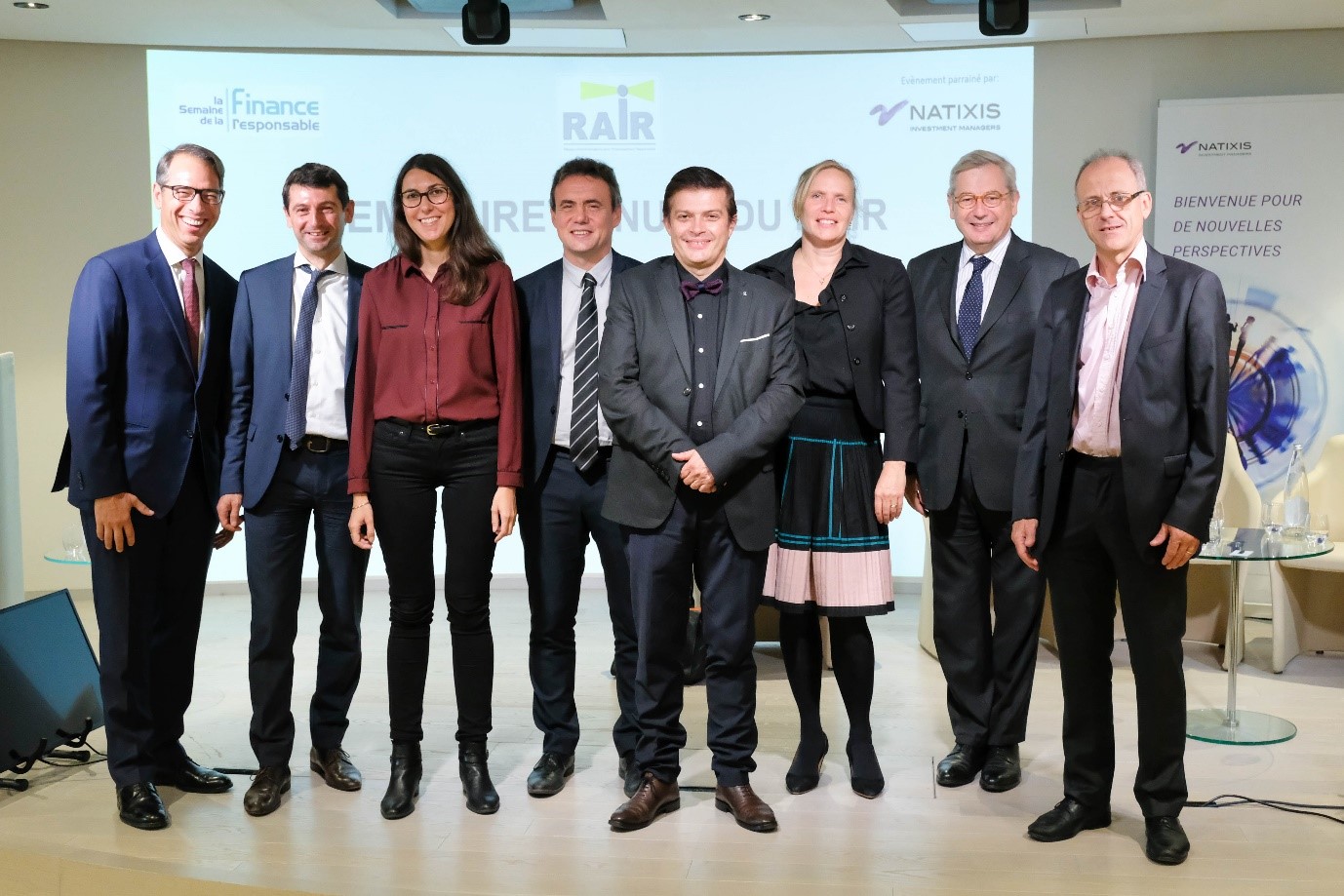Natixis Investment Managers again hosts the annual conference of the Réseau d’Administrateurs pour l’Investissement Responsable (RAIR), the trustee network for responsible investment
RAIR was created in 2013 and is the trustee network for responsible investment. It was set up by trade unionists and brings together the presidents of the main French pension institutions, including ERAFP, FRR, IRCANTEC, PREFON, AGIRC and ARRCO. Together, these funds manage more than 150 billion euros in reserves or assets. RAIR's mission is to exchange best practice for promoting socially responsible investment.
Nearly 80 delegates attended the morning session, with its theme of governance and heard a panel of experts debate the issues affecting socially responsible investment.
In his opening address, Christophe Lanne, CEO and Chief Transformation Officer of Natixis Investment Managers International stressed the ever greater role ESG criteria are playing in investment, as evidenced by the recent UN PRI conference in Paris, sponsored by Natixis, which now has more than 2,500 signatories managing between them more than 90 trillion euros. Governance may not be the sexiest of the three ESG criteria but it is just as essential to success as the other two and a key consideration when it comes to channelling investment into those initiatives with the strongest impact and escaping short-termism.
The seminar was opened by Luc Prayssac, President of the RAIR and a director of IRCANTEC and PREFON. For Luc Prayssac, it is important to make finance more ethical by applying ESG criteria. The RAIR is on the Committee for the Greenfin label, awarded by the Ministry for the Ecological and Solidarity Transition, a director of the Forum de l’Investissement Responsable and also sits on the board of UN Women France. Luc Prayssac lamented the fact that the RAIR had not been better listened to when, in line with its brief, it had duly raised the alarm long before the Carlos Ghosn affair exploded at Renault.
Laurence Méhaignerie, President and co-founder of Citizen Capital, one of the first impact investment funds to launch in France (in 2008), thought the purpose of a corporation must go beyond simply sharing out profits among its owners to take account of social and environmental issues. Citizen Capital invests in SMEs or start-ups with a mission and strong potential to create strategic value both financially and on social/environmental issues. It has therefore invested in OpenClassRoom, a company making education available to all via its massive open online course (MOOC) platform.
According to Laurence Méhaignerie, responsible capitalism raises the question of a more equitable sharing of power and wealth among stakeholders. The shareholder should not dominate over other stakeholders. It is also essential to get more women into leadership positions.
A number of experts were then invited to debate the Renault case in a round table discussion chaired by Béatrice Héraud, CSR editor at Novethic. Contributors were Denis Branche, Managing Director of Phitrust, Loïc Dessaint, CEO of Proxinvest, Renato Guerriero, Global Head of Distribution at Candriam and Benoit Ostertag, Director at Renault and CFDT trade unionist. When the Carlos Ghosn scandal hit at the end of 2018, he had concentrated all power in his hands and had no real counterpower in the Board of Directors. Renault's governance was poor. Carlos Ghosn’s compensation was stratospheric, both in absolute terms and relative to Renault's market performance, and there was no succession planning, which led Candriam to divest its Renault shares. In the panel's view, a more engaged conversation between Renault stakeholders would have been a good way to avoid the crisis. Investors have real responsibility, particularly when it comes to management remuneration - the “say on pay”. They should also act as an early warning system. Companies can define a raison d’être, what they are there for, which may or may not be written into the by-laws.
Dominique Blanc, from the Green and Sustainable Hub at Natixis's Banque de Grande Clientèle, wound up by underlining the penetration of the ESG worldwide, including recently in the United States. ESG practices begin with an exclusion policy, then move on to adoption of ESG criteria, then finally to dialogue with companies. This dialogue should address strategic issues such as governance of climate and environmental risks. These risks are increasingly impacting business models in sectors like auto, where the upcoming transition to electric vehicles is a big issue for automakers. Credit rating agencies are increasingly incorporating ESG criteria to their ratings.
The UN PRIs have, since 23 September 2019, been extended to the banking sector. 130 banks, Natixis among them, have committed to the Principles for Responsible Banking. Natixis is leading the way with its Green Weighting Factor (GWF), a pioneering in-house system for allocating capital similar to a green premium/discount. It feeds into the calculation of analytical risk-weighted assets (analytical RWA) used in the lending policy. It assigns a colour code (from green to brown) and modifies the profitability of each transaction based on its environmental and climate impact. The GWF encourages responsible finance and penalises lending whose impacts are more negative. The tool complements investor's processes in their relation between manufacturers and the financial sector on matters of governance and the environment.

Left to right: Renato Guerriero, Dominique Blanc, Béatrice Héraud, Loïc Dessaint, Luc Prayssac, Laurence Méhaignerie, Denis Branche, Benoit Ostertag.
RCS Paris 453 952 681
Capital: €178 251 690
43 avenue Pierre Mendès France
75013 Paris
www.im.natixis.com
This communication is for information only and is intended for investment service providers or other Professional Clients. The analyses and opinions referenced herein represent the subjective views of the author as referenced unless stated otherwise and are subject to change. There can be no assurance that developments will transpire as may be forecasted in this material.




